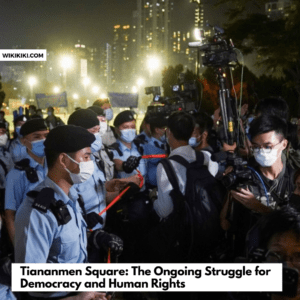The Tiananmen Square massacre, Hong Kong police detained pro-democracy activists and tightened security measures. Authorities had banned public commemoration of the 1989 incident, in which China suppressed peaceful protests in Beijing with tanks and troops. However, dozens of candlelight vigils were expected to take place in cities around the world. Among those detained was 67-year-old activist Alexandra Wong, known as “Grandma Wong.” Hong Kong was previously the only Chinese city where these commemorations were allowed, but public events have been outlawed since 2020 under the national security law imposed by China.
Also Read: Anti-Government Protests: Tens of Thousands Rally in Belgrade

On the anniversary of the Tiananmen Square massacre, the world once again reflects on the tragic events that unfolded in Beijing in 1989. However, this year’s commemoration is overshadowed by the escalating crackdown on pro-democracy activists in Hong Kong. The Chinese government’s increasing control over the city has stifled public remembrance, leading to the detention of activists and the banning of public events. This article explores the significance of Tiananmen Square, the erosion of freedoms in Hong Kong, and the ongoing struggle for democracy and human rights in China.
Tiananmen Square
Tiananmen Square holds a significant place in Chinese history, from Mao Zedong’s proclamation of the founding of the country to the pro-democracy protests of 1989. The movement, primarily led by students, demanded political freedoms and an end to corruption. However, the government responded with a violent crackdown, leading to the loss of many lives. The iconic image of a lone protester facing down a column of tanks has become a symbol of resistance and the fight for freedom.
The Tiananmen Square protests were a watershed moment in modern Chinese history. Beginning in April 1989, thousands of students and other citizens gathered in Beijing’s Tiananmen Square to call for political reforms, freedom of speech, and an end to corruption. The movement grew rapidly, attracting support from various sectors of society and spreading to other cities across China. The protesters’ demands reflected a desire for greater political freedoms and democratic reforms in the face of government corruption and authoritarian rule.
Also Read: Utah School District Bans Bible for ‘Vulgarity and Violence’
On the night of June 3-4, 1989, the Chinese government declared martial law and deployed troops and tanks to suppress the protests. The military crackdown on the peaceful demonstrators was brutal, resulting in the loss of numerous lives. The Chinese government’s official death toll is still disputed, but it is widely believed that hundreds, if not thousands, of people were killed. The images of the “Tank Man” standing in front of a column of tanks have become iconic symbols of the protests and the struggle for freedom.
Hong Kong
Hong Kong, under the “one country, two systems” principle, was previously the only Chinese city where commemorations of the Tiananmen Square massacre were allowed. However, with the passing of the controversial national security law in 2020, Hong Kong’s freedoms and autonomy have come under threat. The law has been used to curtail dissent, silence pro-democracy voices, and restrict public gatherings, including the annual commemorations of the Tiananmen Square massacre. This erosion of civil liberties has sparked outrage both locally and internationally, as Hong Kong’s unique status as a bastion of freedom is gradually eroded.
The National Security Law
In 2020, the Chinese government imposed a controversial national security law on Hong Kong, which severely curtailed civil liberties and political dissent. The law grants broad powers to authorities, enabling them to crack down on perceived threats to national security. Since its implementation, numerous pro-democracy activists have been arrested, media outlets have faced increased censorship, and public demonstrations have been banned.
Also Read: Senegal Violence: Deadly Clashes in Following Opposition Leader’s Sentencing
Loss of Democracy
The detention of pro-democracy activists on the anniversary of the Tiananmen Square massacre is a stark reminder of the erosion of democratic values in Hong Kong. Alexandra Wong, known as “Grandma Wong,” and other prominent activists have been targeted by the authorities. These arrests not only silence dissenting voices but also aim to instill fear and discourage any form of protest against the government’s policies.
The Tiananmen Square massacre and the current situation in Hong Kong highlight the ongoing struggle for democracy and human rights in China. Despite the government’s attempts to suppress dissent, many individuals and organizations continue to advocate for political freedoms, freedom of expression, and the rule of law. The international community plays a crucial role in supporting these efforts and holding China accountable for its actions.
Despite the risks and challenges, activists and supporters around the world refuse to let the memory of Tiananmen Square fade away. Candlelight vigils, protests, and other forms of remembrance continue to be held in cities globally, demonstrating solidarity with the brave individuals who fought for democracy and freedom in 1989. These gatherings not only honor the victims of the massacre but also serve as a reminder that the fight for human rights in China is far from over.
The Tiananmen Square massacre remains a deeply significant event in Chinese history, symbolizing the fight for democracy and human rights. The erosion of freedoms in Hong Kong, exemplified by the recent detention of activists on the anniversary, demonstrates the Chinese government’s determination to suppress dissent and maintain control.
However, the memory of Tiananmen Square lives on, both within and outside China, as a reminder of the ongoing struggle for democracy and the importance of upholding fundamental human rights. It is imperative for the international community to stand in solidarity with those fighting for freedom and to press for accountability and change in China. Only through collective efforts can we hope to see a future where democracy and human rights prevail.
Also Read: Liverpool to Host KyivPride March On Behalf of Ukraine’s LGBTQ+ Community


















+ There are no comments
Add yours